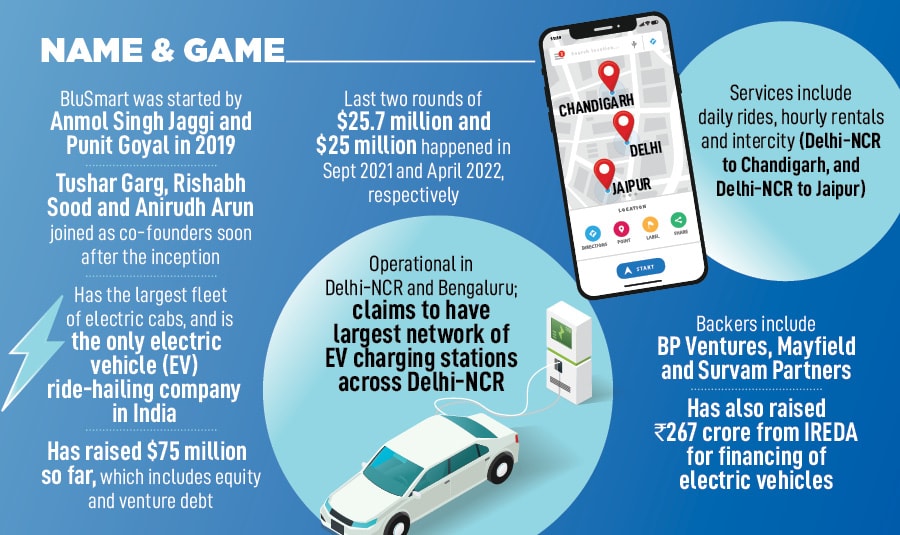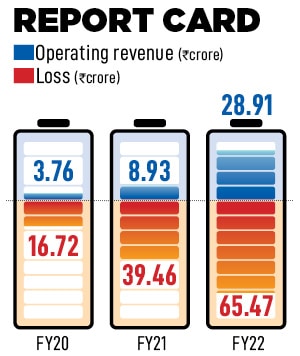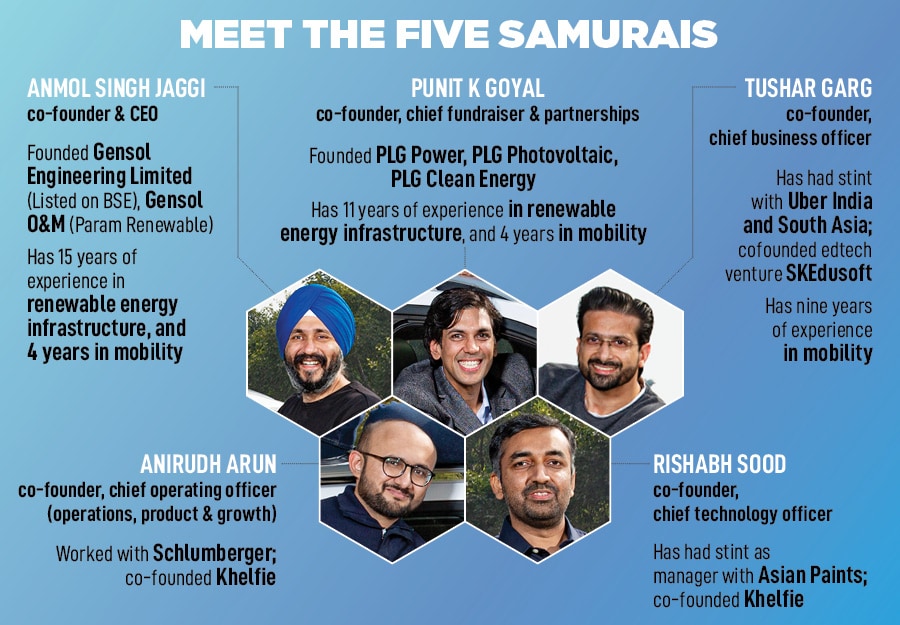The co-founders had butterflies fluttering in their stomach. It was nothing less than daredevilry to take on the might of Ola and Uber in the ride-hailing business. “Arey tumhe pata bhi hai tum kya kar rahe ho (Do you guys even know what you are up to) was how a clutch of well-wishers expressed their concern. “Nobody will take a bet on you" was the loud voice from naysayers. “They (Ola and Uber) can turn their fleet into EV and you would be out of the game," was another recurrent theme that resonated strongly with the critics. The advice to them was to “grow up, step back and think of some other business".
The mavericks, however, decided to stay on course. To begin with, Anmol Singh Jaggi was not a greenhorn. He is a renewable energy entrepreneur, who started Ahmedabad-based Gensol Engineering, an EPC (engineering procurement and construction) and solar advisory firm, in 2012, and took the company to IPO in October 2019. Punit Goyal too was not a rookie. Over a decade in the solar business, Goyal had built three companies. In fact, one of them was in partnership with renewable energy solutions provider Suzlon.
The third partner, Tushar Garg, was also not a novice. An edtech entrepreneur, Garg had co-founded SKEduSoft in 2010. "Probably, the term edtech didn’t even exist then," smiles grad from IIT Delhi, recalling his brief stint of two years, after which he joined Uber India in 2014. The other two co-founders in BluSmart also came with heft.
Anirudh Arun had co-founded Khelfie in 2015 and continued with the sports analytics business till 2019. Rishabh Sood, another co-founder in Khelfie, has had stint with Asian Paints. “All of us were smart enough to know what we were up to," recalls Garg, who was leading the ‘five samurais’ to meet the VC in Bengaluru.
![]() The smartest part of their plan was something that gave the five friends enough confidence to take the plunge. “We started as vendors of Uber," smiles Jaggi. “BluSmart ne pehli gaadi Uber pe chalayi (BluSmart’s first car ran on Uber’s platform," he says, adding that between March and November 2019, BluSmart had its EV fleet of around 70 cars running on Uber. The co-founders ended up having a first-hand experience of ride-hailing business, they got a hang of the best and worst of the technology and operational part of the venture, and in the process, they also got to know the ‘chinks in the armour’ of the so-called Goliaths of ride hailing.
The smartest part of their plan was something that gave the five friends enough confidence to take the plunge. “We started as vendors of Uber," smiles Jaggi. “BluSmart ne pehli gaadi Uber pe chalayi (BluSmart’s first car ran on Uber’s platform," he says, adding that between March and November 2019, BluSmart had its EV fleet of around 70 cars running on Uber. The co-founders ended up having a first-hand experience of ride-hailing business, they got a hang of the best and worst of the technology and operational part of the venture, and in the process, they also got to know the ‘chinks in the armour’ of the so-called Goliaths of ride hailing.
Back in Bengaluru in December 2019, Garg was about to make the investment pitch. And he was dead sure that there were no chinks in his presentation. He was wrong. “Come on guys, even my dogs get ample space in the cab," commented the acclaimed VC, negating Garg’s point that users did not get enough boot space in CNG cabs, which, according to him, offered EVs and BluSmart an advantage.
The investor was not impressed one bit. “Is it a joke? Nobody in her senses would ever think of ditching the incumbents because of ‘less space,’ she continued with her scathing attack on the co-founders. “Do you have anything substantial? Or have you come to just waste my time," she yelled. Now it was Jaggi’s turn to placate the lady luck. “Our biggest differentiator," he said, “is that we are a full-stack model." BluSmart, he explained, owned the EVs, has its own drivers who were on the rolls, and also owned the EV charging infrastructure. “We own everything, and that’s why we are best placed to win consumers love," he stressed. BluSmart, he added, doesn’t have any surge pricing or frequent cancellation that the rivals are notorious for. “We will offer a clean and green ride."
![]() The VC, though, remained ruthless in her thrashing of the young men. “Who will bankroll your ambitious full-stack model," she asked. Ola and Uber, according to her, could have bought and owned everything. “But they were smart enough not to. Only idiots do full-stack these days," she said. The cofounders were in a state of unbelievable shock. "We were thrashed left, right and centre," recalls Garg. The VC in Bengaluru was, in fact, not the only one to decline funding. Nobody saw any merit in an electric fleet, full-stack business model, and the audacity to challenge Ola and Uber.
The VC, though, remained ruthless in her thrashing of the young men. “Who will bankroll your ambitious full-stack model," she asked. Ola and Uber, according to her, could have bought and owned everything. “But they were smart enough not to. Only idiots do full-stack these days," she said. The cofounders were in a state of unbelievable shock. "We were thrashed left, right and centre," recalls Garg. The VC in Bengaluru was, in fact, not the only one to decline funding. Nobody saw any merit in an electric fleet, full-stack business model, and the audacity to challenge Ola and Uber.
The friends, though, decided to go ahead with their electric act. The silver lining, and it was a huge positive charge for any founder, was that they were not dependant on institutional money to start their venture. The former entrepreneurs pooled some capital, roped in some high net-worth individuals (HNIs), and bought around 70 cars. “There was no U-turn," says Jaggi. The friends came back to Gurugram, launched their app as planned on December 5, 2019, and BluSmart started its electric journey.
Fast forward to January 2023. The ride has been nothing less than electrifying. With over 3,000 cars, BluSmart has emerged as the largest fleet of electric cabs, and is the only EV ride-hailing company in the country. The startup is operational in Delhi-NCR and Bengaluru, and claims to have the largest network of EV charging stations across the Delhi-NCR region. What’s interesting is the backers that the co-founders have managed to on-board. The firm has raised $75 million so far, and counts BP Ventures, Mayfield and Survam Partners among its funders.
Jaggi and his gang is elated with the success so far. From 42 trips on Day 1, BluSmart managed to clock 1,400 trips every day till February 2020. Then Covid-19 came knocking and everything went down to zero in March. The story didn’t change for the next few months. But the turning point came in 2021. There was a rebound, and now the EV startup clocks on an average 17,000 trips a day, according to the co-founders. “Today, our airport market share—rides to and from airport in Delhi NCR—is a bit under 20 percent, which makes us third-biggest," claims Garg, who had joined Uber as operations manager in 2014. Five years later, he quit the ride-hailing giant and joined BluSmart as a co-founder. In terms of overall market share, Garg claims that the upstart is narrowing the gap at a furious pace. Delhi-NCR, he underlines, is the biggest ride-hailing market in the country.
The backers too are contended with the performance. “We like mavericks," says Nikhil Khattau, managing director at Mayfield India, the VC firm that was the first institutional investor in BluSmart in 2019. “We were not afraid of being contrarian, and the only man in the field," says Khattau, alluding to taking a bet on a business model that involved owning everything rather than the asset-light aggregation model. “It’s not necessarily a winner takes all market," he says, justifying his move to back a third player in a well-entrenched market dominated by Ola and Uber. Ride-hailing, he explains, is also about service level and not just economics per driver. “In India, the rivals had left a lot to be desired. There was a gap," he says.
Khattau points out the white space in aggregation business model. First, the driver economics was getting bad. The driver went out of the business, didn’t have money to pay the EMIs for their cars, and a huge chunk of car supply was off the road. What was also making them disgruntled was a margin structure that was increasingly getting skewed in the favour of the aggregators, and an almost non-existent incentive structure. Secondly, consumers have been at the receiving end of surge pricing, frequent cancellation and shoddy cab experience. “Aggregation allows you to scale but it comes with its fair share of problems," the investor says.
![]()
The full-service model gave BluSmart an edge. It allowed the startup to control service, customer experience and unit economics. “It’s all about car economics, driver economics and customer delight. If drivers are happy, customers would be happy," says Khattau, adding that EV also happened to be another huge plus. “It was a big moat," he says. For any incumbents, it’s extremely difficult to break the deep-entrenched business model. “So we felt that Ola and Uber might experiment with EV, but it would be on the edges," he says.
Though BluSmart has had an electric uptick, challenges remain. Khattau points out some of them. “Let’s put things in perspective. They are in Delhi-NCR and Bengaluru. It’s still a nascent business," he says. The challenger brand needs to think of scale, and grow sustainably. “The car unit economics is paramount, and you need to utilise the car," he says, alluding to BluSmart’s approach of offering inter-city rides from Delhi NCR. They must also stay away from land grab. There are people who have done that, and the jury is out on that. “It all boils down to execution and focus," he adds.
Jaggi and Goyal, for their part, know the immense value of execution. Both of them had faced bankruptcy in their earlier stint as founders around 2012. Though both eventually managed to turn around the business and pay back all the debts, the learning are deep and invaluable. “With BluSmart we are trying to disrupt the mobility world in India," says Goyal, who dubs himself as a specialist in shooting cold emails. “That’s how we managed to get so many backers," he smiles.
![]()
His co-founder, though, had managed to do something no one could imagine. A first-time entrepreneur, Jaggi had started a carbon credit business when he was in college. The trigger was love. “I fell in love with this girl who happened to be in Pune," he recalls. They used used to talk a lot and mobile bills would at times zoom to around Rs40,000. “I also needed money to fly to Pune and meet her every weekend," he recalls. All this led to starting the carbon credit business, which shuttered after a few years to make way for Gensol, which got listed in 2018.
Back in Gurugram, the co-founders of BluSmart know the journey would have its share of speed-breakers. The have put on their seat belts. So far, Jaggi underlines, ride-hailing companies have looked at users and drivers from the rear-view mirror. “We have given them front seat," he signs off.


 The smartest part of their plan was something that gave the five friends enough confidence to take the plunge. “We started as vendors of Uber," smiles Jaggi. “BluSmart ne pehli gaadi Uber pe chalayi (BluSmart’s first car ran on Uber’s platform," he says, adding that between March and November 2019, BluSmart had its EV fleet of around 70 cars running on Uber. The co-founders ended up having a first-hand experience of ride-hailing business, they got a hang of the best and worst of the technology and operational part of the venture, and in the process, they also got to know the ‘chinks in the armour’ of the so-called Goliaths of ride hailing.
The smartest part of their plan was something that gave the five friends enough confidence to take the plunge. “We started as vendors of Uber," smiles Jaggi. “BluSmart ne pehli gaadi Uber pe chalayi (BluSmart’s first car ran on Uber’s platform," he says, adding that between March and November 2019, BluSmart had its EV fleet of around 70 cars running on Uber. The co-founders ended up having a first-hand experience of ride-hailing business, they got a hang of the best and worst of the technology and operational part of the venture, and in the process, they also got to know the ‘chinks in the armour’ of the so-called Goliaths of ride hailing. The VC, though, remained ruthless in her thrashing of the young men. “Who will bankroll your ambitious full-stack model," she asked. Ola and Uber, according to her, could have bought and owned everything. “But they were smart enough not to. Only idiots do full-stack these days," she said. The cofounders were in a state of unbelievable shock. "We were thrashed left, right and centre," recalls Garg. The VC in Bengaluru was, in fact, not the only one to decline funding. Nobody saw any merit in an electric fleet, full-stack business model, and the audacity to challenge Ola and Uber.
The VC, though, remained ruthless in her thrashing of the young men. “Who will bankroll your ambitious full-stack model," she asked. Ola and Uber, according to her, could have bought and owned everything. “But they were smart enough not to. Only idiots do full-stack these days," she said. The cofounders were in a state of unbelievable shock. "We were thrashed left, right and centre," recalls Garg. The VC in Bengaluru was, in fact, not the only one to decline funding. Nobody saw any merit in an electric fleet, full-stack business model, and the audacity to challenge Ola and Uber.
